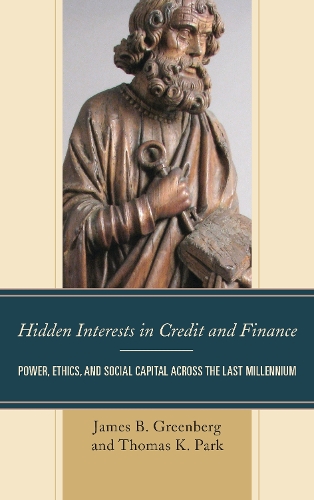
Hidden Interests in Credit and Finance: Power, Ethics, and Social Capital across the Last Millennium
(Paperback)
Available Formats
Publishing Details
Hidden Interests in Credit and Finance: Power, Ethics, and Social Capital across the Last Millennium
By (Author) James B. Greenberg
By (author) Thomas K. Park
Bloomsbury Publishing PLC
Lexington Books
23rd May 2019
United States
Classifications
Professional and Scholarly
Non Fiction
Finance and the finance industry
European history: medieval period, middle ages
General and world history
332.09
Physical Properties
Paperback
330
Width 154mm, Height 225mm, Spine 20mm
526g
Description
In this book, James B. Greenberg and Thomas K. Park take an anthropological approach to the economic history of the past one thousand years and define credit as a potentially transformative force involving inequalties, rather than an exchange of equal valued commodites. Guiding readers through the medieval period all the way to the modern day, and tracking through the Mediterranean and Europe, Greenberg and Park reorient financial history and position social capital and ethical thought at its center. They examine the multicultural origins of credit and finance, from banking to credit cards and predatory lending, and bringing us up to date, they explore the forces that led to the collapse of global credit markets in 20072008. This book is recommended for scholars of anthropology, history, economics, religion, and sociology.
Reviews
This compelling account of the long history of credit and its animating ideas over the past thousand years convincingly shows that the symbolic, moral and social entailments of finance have always sat alongside its abstraction. Excavating the former provides a necessary perspective on the obscurantism and often dangerous persuasiveness, particularly in the present era, of the latter. -- Bill Maurer, University of California, Irvine
This monumental work reminds us that credit and debt are social and personal relationships made up of mutual dependency, ethical obligations, and the distribution of benefits. Park and Greenberg integrate a masterful study of the deeply religious dimensions of economic thought and practice in the Mediterranean and northern Europe over the last two millennia with granular treatments of merchants in Morocco, the Atlantic slave trade, consumer debt in England, and the 2008 financial meltdown. The result is piercing anthropological brilliance that eliminates any shadow of a doubt that social inequality is a social and cultural construction, and provides a range of tools for understanding the particular and general forms that it takes, past and present. The argument that ethical social relations are at the heart of our economy charts a path to a more human engagement with each other and with our planet. -- Casey Walsh, University of California Santa Barbara
Author Bio
James B. Greenberg is professor of anthropology and senior research anthropologist at the University of Arizona. Thomas K. Park is associate professor of anthropology at the University of Arizona.
